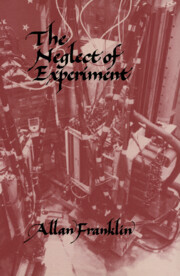Book contents
- Frontmatter
- Contents
- Acknowledgments
- List of abbreviations
- Introduction
- 1 The discovery of parity nonconservation
- 2 The nondiscovery of parity nonconservation
- 3 CP or not CP
- 4 The role of experiment
- 5 Do experiments tell us about the world?
- 6 The epistemology of experiment
- 7 The epistemology of experiment: case studies
- 8 Forging, cooking, trimming, and riding on the bandwagon: fraud in science
- Conclusion
- Notes
- Index
6 - The epistemology of experiment
Published online by Cambridge University Press: 15 December 2009
- Frontmatter
- Contents
- Acknowledgments
- List of abbreviations
- Introduction
- 1 The discovery of parity nonconservation
- 2 The nondiscovery of parity nonconservation
- 3 CP or not CP
- 4 The role of experiment
- 5 Do experiments tell us about the world?
- 6 The epistemology of experiment
- 7 The epistemology of experiment: case studies
- 8 Forging, cooking, trimming, and riding on the bandwagon: fraud in science
- Conclusion
- Notes
- Index
Summary
Although all scientists and philosophers of science are agreed that science is based on observation and experiment, very little attention has been paid to the question of how we come to believe rationally in an experimental result, or, in other words, to the problem of the epistemology of experiment. How do we distinguish between a result obtained when an apparatus measures or observes a quantity and a result that is an artifact created by the apparatus? In this chapter I suggest that there are various strategies that both provide justification for rational belief in an experimental result and are used by practicing scientists. We shall be concerned here primarily, although not exclusively, with observations or results that are interpreted within an existing theory. Although a devout skeptic might doubt the validity of pointer readings or chart recordings, I do not believe that is the important question about the validity of experimental results.
Ian Hacking has made an excellent start on discussing these issues. He points out that most modern experiments involve complex apparatus, and so, at the very least, the results are loaded with the theory of that apparatus. Dudley Shapere has extended the idea of “direct observation” to include theoretical beliefs explicitly. In his discussion of the solar neutrino experiments, he stated that “X is directly observed if (1) information is received, by an appropriate receptor and (2) that information is transmitted directly, i.e. without interference, to the receptor from the entity X (which is the source of the information).”
- Type
- Chapter
- Information
- The Neglect of Experiment , pp. 165 - 191Publisher: Cambridge University PressPrint publication year: 1986



